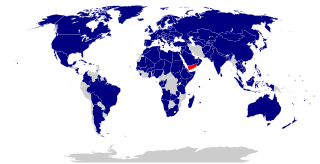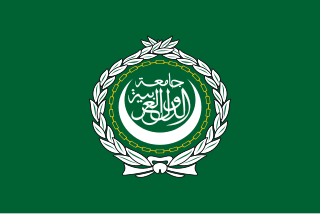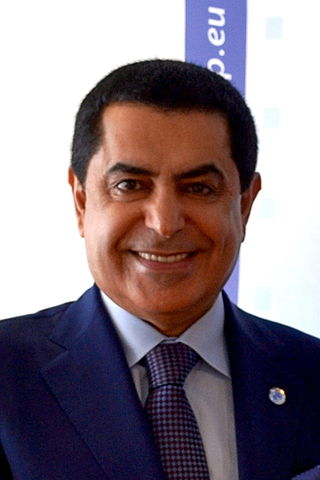
Since its independence in 1961, Kuwait maintained strong international relations with most countries, especially nations within the Arab world. Its vast oil reserves gives it a prominent voice in global economic forums and organizations like the OPEC. Kuwait is also a major ally of ASEAN, a regional ally of China, and a major non-NATO ally.

The United Nations Economic and Social Council is one of the six principal organs of the United Nations, responsible for coordinating the economic and social fields of the organization, specifically in regards to the fifteen specialised agencies, the eight functional commissions, and the five regional commissions under its jurisdiction.

The foreign relations of Yemen are the relationships and policies that Yemen maintains with other countries. It is a member of the United Nations, the Arab League, and the Organisation of Islamic Cooperation. Yemen participates in the nonaligned movement. The Republic of Yemen accepted responsibility for all treaties and debts of its predecessors, the YAR and the PDRY. Additionally, India acceded to the Nuclear Non-Proliferation Treaty and has stressed the need to render the Middle East region free of nuclear and other weapons of mass destruction.

The Arab League, formally the League of Arab States, is a regional organization in the Arab world, which is located in North Africa, West Asia, and part of East Africa. The Arab League was formed in Cairo on 22 March 1945, initially with six members: Egypt, Iraq, Transjordan, Lebanon, Saudi Arabia, and Syria. Yemen joined as a member on 5 May 1945. Currently, the League has 22 members.

The United Nations System consists of the United Nations' six principal bodies, the Specialized Agencies and related organizations. The UN System includes subsidiary bodies such as the separately administered funds and programmes, research and training institutes, and other subsidiary entities. Some of these organizations predate the founding of the United Nations in 1945 and were inherited after the dissolution of the League of Nations.

The United Nations Economic and Social Commission for West Asia is one of five regional commissions under the jurisdiction of the United Nations Economic and Social Council. The role of the Commission is to promote economic and social development of Western Asia through regional and subregional cooperation and integration.

The Council of Arab Economic Unity (CAEU) was founded by Egypt, Iraq, Jordan, Kuwait, Libya, Mauritania, Palestine, Saudi Arabia, Sudan, Tunisia, Syria, United Arab Emirates and Yemen on May 30, 1964, following an agreement in 1957 by the Economic Council of the Arab League.

Sheikh Abdullah bin Zayed bin Sultan Al Nahyan is the Minister of Foreign Affairs of the United Arab Emirates. He is a son of the founder of the United Arab Emirates, Zayed bin Sultan Al Nahyan. In 2020, he was a signatory of the Abraham Accords on behalf of the UAE.
The Government of Sudan is the federal provisional government created by the constitution of Sudan having the executive, parliament, and the judiciary. Previously, a president was head of state, head of government, and commander-in-chief of the Sudanese Armed Forces in a de jure multi-party system. Legislative power was officially vested in both the government and in the two chambers, the National Assembly (lower) and the Council of States (higher), of the bicameral National Legislature. The judiciary is independent and obtained by the Constitutional Court. However, following a deadly civil war and the still ongoing genocide in Darfur, Sudan was widely recognized as a totalitarian state where all effective political power was held by President Omar al-Bashir and his National Congress Party (NCP). However, al-Bashir and the NCP were ousted in a military coup which occurred on April 11, 2019. The government of Sudan was then led by the Transitional Military Council or TMC. On 20 August 2019, the TMC dissolved giving its authority over to the Sovereignty Council of Sudan, who were planned to govern for 39 months until 2022, in the process of transitioning to democracy. However, the Sovereignty Council and the Sudanese government were dissolved in October 2021.

Talal Abu-Ghazaleh is the chairman and founder of the international Jordan-based organisation, the Talal Abu-Ghazaleh Organization (TAG-Org). Dubbed as the godfather of Arab accounting, Abu-Ghazaleh has also been credited for promoting the significance of Intellectual Property in the Arab World.

The Arab Monetary Fund (AMF) is a regional Arab organization, a working sub-organization of the Arab League. It was founded 1976, and has been operational since 1977.

Model Arab League is an educational simulation in which students learn about diplomacy and international relations through debates in multi-regional model competitions, competing as representatives from the Member States of the Arab League. MAL was established in 1983 by The National Council on US - Arab Relations as a Youth Leadership Development Program.

Government of the Syrian Arab Republic is the union government created by the constitution of Syria whereby the president is the head of state and the prime minister is the head of government. Executive power is exercised by the government. Syria has a legislative council with 250 members. The country has been in a civil war since 2011 against various domestic and foreign forces that oppose both the Syrian government and each other, in varying combinations. The seat of the government is located in Damascus, Syria.

The Arab Customs Union is a customs union announced at the Arab League's 2009 Arab Economic and Social Development Summit in Kuwait in order to achieve a functional customs union by 2015 and an Arab common market by 2020 and to increase inter-Arab trade and integration.

The Economic and Social Council of the Arab League is an institution of the Arab League that co-ordinates its economic integration. The ESC was established as the Economic Council under the terms of the Joint Defence and Economic Co-operation Treaty (1950). and held its first meeting in 1953. In 1957, the ESC established the Council of Arab Economic Unity (CAEU) and, in February 1997, the ESC adopted the Agreement to Facilitate and Develop Trade Among Arab Countries (1981) in pursuit of the Greater Arab Free Trade Area (GAFTA).

Rima Khalaf Hunaidi is a national of Jordan who served as Executive Secretary of the United Nations Economic and Social Commission for Western Asia (ESCWA) from 2010 to 2017. She resigned from this position in March 2017, rather than comply with a request from the UN Secretary General António Guterres to withdraw a report that accused Israel of establishing an apartheid regime.

Dr. Saeb N. Jaroudi was the former Minister of National Economy, Industry, and Tourism in Lebanon and the first Chairman of the Board and President of the Kuwait-based Arab Fund for Economic and Social Development. He held a number of leadership roles in the Arab world, Europe, and the United States throughout his career.

The Sixty-sixth Session of the United Nations General Assembly opened on 13 September 2011 at 15:00 and was presided over by former Qatari permanent representative to the UN Nassir Abdulaziz Al-Nasser. The session ended on 18 September as al-Nasser symbolically passed the gavel to the president of the next session, Vuk Jeremic.
The Arab Institute for Statistics (Arabic: المعهد العربي للإحصاء), formally the Arab Institute for Training and Research in Statistics (AITRS) (Arabic: المعهد العربي للتدريب والبحوث والإحصاء) is an intergovernmental statistical institute serving the National Statistical Offices in all Arab League countries established in 1971 by the United Nations Development Programme (UNDP) under the name "Regional Institute for training and Research in Statistics for the Near East".

Ghada Fathi Waly is an Egyptian politician who has been serving as the Director-General/ Executive Director of the United Nations Office at Vienna (UNOV)/ United Nations Office on Drugs and Crime (UNODC) since 2020, following her appointment by Secretary-General António Guterres. She holds the rank of Under-Secretary-General of the United Nations.


















